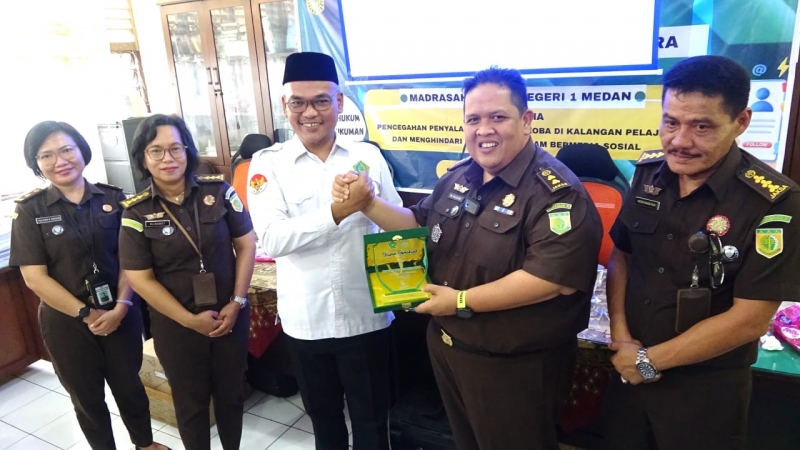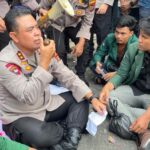The High Prosecutor’s Office of North Sumatra (Kejati Sumut) conducted a legal outreach program for students of Madrasah Aliyah Negeri (MAN) 1 Medan on William Iskandar Street, Medan City.
The aim was to support government efforts in early prevention of drug abuse and to address the increasing number of social media users facing legal consequences due to misuse of social platforms.
The event was opened by the Acting Head of the Legal Information Section of Kejati Sumut, witnessed by the Principal of MAN 1 Medan, teaching staff, and a team of prosecutors from the intelligence division of Kejati Sumut.
During the session, the prosecutor team from the intelligence division advised the students of MAN 1 Medan to avoid drug abuse, as it would bring regret and harm to themselves, their families, and society.
“The cornerstone of drug prevention lies in faith, piety, and the family environment of each student,” they emphasized.
Regarding the rise in legal cases involving social media users under the Electronic Information and Transactions Law (ITE), the prosecutors urged students to be cautious and wise in their social media use, emphasizing restraint and self-control to avoid future regrets.
At the end of the event, the school leadership of MAN 1 Medan expressed gratitude to Kejati Sumut for the opportunity, hoping that students would stay away from drug abuse and use social media responsibly.
The legal outreach was conducted as part of the Prosecutor’s Office’s commitment to preventing drug abuse and social media ethics violations, aiming to minimize criminal offenses in society.
High Prosecutor’s Office of North Sumatra
The **High Prosecutor’s Office of North Sumatra** is a key legal institution in Medan, Indonesia, responsible for overseeing prosecutions and upholding justice in the province. Established as part of Indonesia’s judicial system, it plays a vital role in handling criminal cases, corruption, and legal supervision in North Sumatra. Its history reflects Indonesia’s broader efforts to strengthen law enforcement and governance since independence.
Madrasah Aliyah Negeri (MAN) 1 Medan
Madrasah Aliyah Negeri (MAN) 1 Medan is a prominent Islamic senior high school in Medan, Indonesia, known for combining religious and general education. Established as part of Indonesia’s public madrasah system, it has played a key role in providing quality education while promoting Islamic values. Over the years, it has produced many graduates who contribute to both religious and secular fields in Indonesian society.
William Iskandar Street
William Iskandar Street is a notable thoroughfare in Johor Bahru, Malaysia, named after Dato’ William Tan Sri Iskandar, a prominent local figure and former civil servant who contributed to the state’s development. The street is known for its commercial and cultural significance, housing various businesses and landmarks that reflect Johor’s vibrant urban life. Its history is tied to Johor Bahru’s growth as a key economic and administrative hub in southern Malaysia.
Medan City
Medan City, the capital of North Sumatra, Indonesia, is a vibrant cultural and economic hub known for its diverse heritage, influenced by Malay, Chinese, Indian, and Dutch colonial history. Established in the 16th century, it grew significantly during the Dutch colonial era as a center for tobacco and rubber plantations. Today, Medan is famous for landmarks like the Maimun Palace and the Great Mosque, reflecting its rich multicultural past.
Legal Information Section of Kejati Sumut
The Legal Information Section of Kejati Sumut (North Sumatra Prosecutor’s Office) is a division that provides legal information and education to the public, promoting transparency and legal awareness. It operates under Kejati Sumut, which enforces law and prosecution in North Sumatra, Indonesia. The section likely supports community legal literacy and access to justice, though specific historical details about its establishment are not widely documented.
Electronic Information and Transactions Law (ITE)
The **Electronic Information and Transactions Law (ITE Law)** is an Indonesian regulation enacted in 2008 to govern digital activities, including electronic transactions, data protection, and online content. It aims to promote e-commerce while addressing cybercrime, though it has been controversial for its broad provisions on defamation and internet censorship. The law has been amended multiple times, reflecting evolving challenges in Indonesia’s digital landscape.






